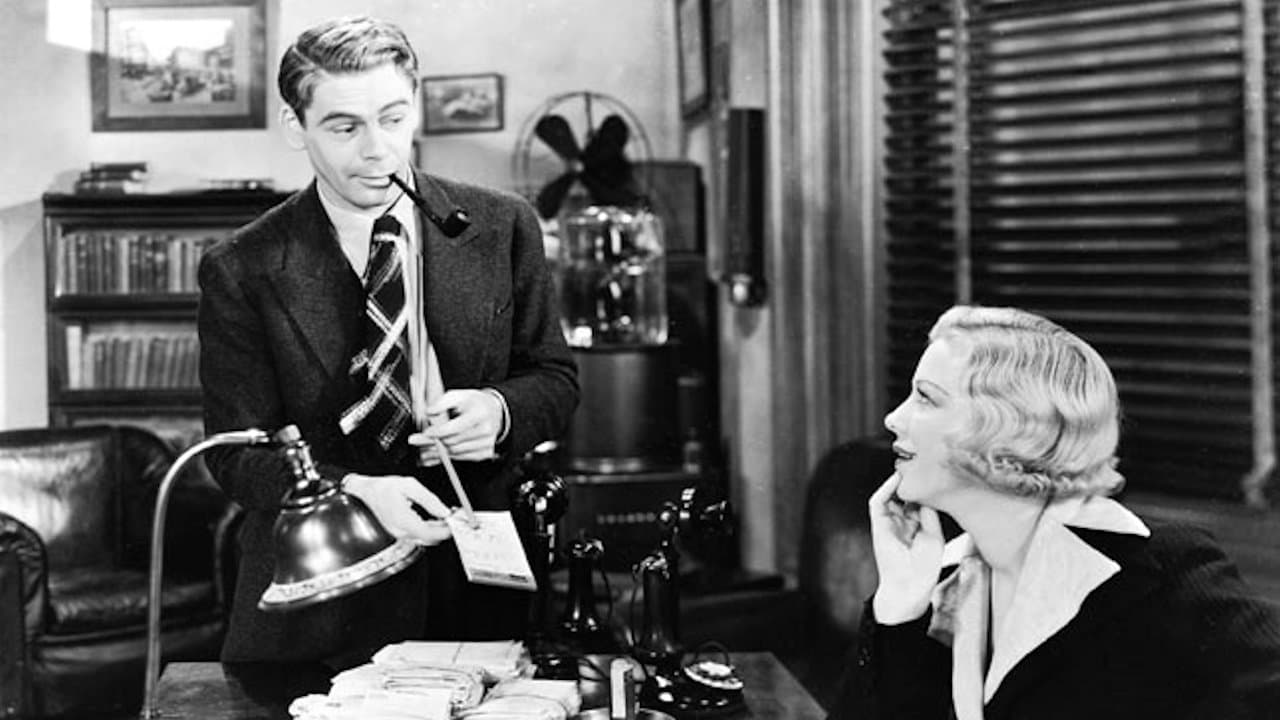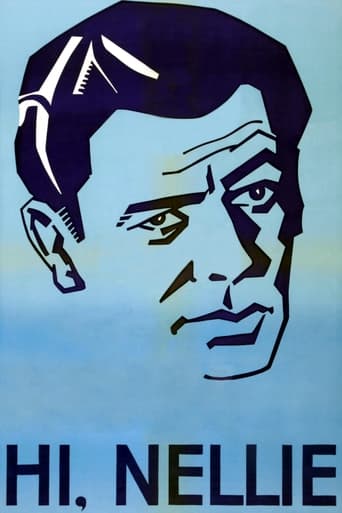

Directed by Mervyn LeRoy, and featuring a screenplay co-written by Abem Finkel, this crime comedy-drama was later remade with Ronald Reagan as Love is in the Air (1937), then again with George Brent in You Can't Escape Forever (1942), and finally as The House Across the Street (1949) with Wayne Morris. This one stars Paul Muni, who would win an Oscar on his fourth (of six) Best Actor nomination(s) the following year playing the title character in The Story of Louis Pasteur (1935).Sam Bradshaw (Muni) is the managing editor of the newspaper run by John Graham (Berton Churchill). He'd bumped reporter Gerry Krale (Glenda Farrell) down to the "Dear Abby"-type job that no one wants when she made a mistake, falling asleep and missing a big story, some time earlier (before the film begins). The paper's lovelorn columnist uses the byline "Nellie Nelson", so Gerry's peers yell "Hi, Nellie!", ridiculing her, every time she passes through the newsroom. Hobart Cavanaugh plays "Fully" Fullerton, a reporter who is rejected every time he asks Gerry for a date. Donald Meek plays "Durky" Durkin, an office boy for the past 40 years. When two stories break at the same time, one about the disappearance of a bank executive and another about that same bank going bankrupt, the assistant editor Dawes (Douglass Dumbrille) is ready to link the two with big headlines on the front page. Sam, however, stops it saying he doesn't run that kind of story without supporting facts, besides, he says "the guy's always been on the level". Every other paper apparently does, so Sam is "called to the mat" by his boss Graham, who's just finished meeting with O'Connell (Edward Ellis). Thanks to Sam's lawyer (Frank Reicher), Graham can't fire him. So, his publisher reassigns Sam to the Nellie Nelson job.Disgruntled, Sam starts drinking and is all but finished after a couple of months of barely doing the new column. However, Gerry catches up with him at a bar and tells him he's got no guts. Out to prove her wrong, Sam starts doing the heartthrob job in earnest. During this time he meets Rosa Marinello (Dorothy Le Baire), a woman whose undertaker father has refused to give her permission to marry. After three months, Sam is called into his publisher's office again. Thinking he's about to get his old job back, Sam is shocked to learn that, because his "Nellie" column has increased the paper's circulation, Graham wants him to keep doing it. Upset, he returns to his office where Shammy (Ned Sparks), one of the paper's investigators, tells Sam he's got a lead in the disappearance of the bank executive - an address from his wife (Marjorie Gateson). Sam notices that the address Shammy gives him happens to match one that Miss Marinello gave him. John Qualen appears, uncredited, as the janitor of an empty apartment. This eventually leads the two of them to visit Mr. Marinello (George Humbert), where they trap him into revealing that there's been a phony burial, and then follow the panicked man to the "Merry Go Round" club, which happens to be owned by suspected crime boss Beau Brownell (Robert Barrat). Once inside the club, the two also see O'Connell.The whole scheme starts to unravel, with Sam bluffing his way into getting a confirmation from Brownell to what he suspects has happened, after he'd roused a drunken bank cashier (George Meeker), that Shammy had recognized, in his office. Then it's a race against time, with the newspaper men calling in their "troops" and the "gangster" his. Guess who wins and guess who then gets assigned the heartthrob column?
... View MoreHI, NELLIE! is a fun film to watch but in no way could it be mistaken for a deep or high quality product. Instead, it's just simple fun--plot holes and all.Paul Muni plays a managing editor at a newspaper. However, his decision to underplay a big story is second-guessed by the owner and as a result, he is demoted to writing a "lonely hearts" column. His co-workers ridicule him unmercifully, but after initially refusing this indignity, he actually makes a success of it. However, he always is thinking about how to get his old job back, as he misses the excitement of crime and other lurid stories.The film has some very good support for Muni, with Glenda Farrell, Donald Meek, Douglass Dumbrille, Ned Sparks, Robert Barrat and others. So, while it's a relatively cheap and silly production, the supporting characters make it a lot more interesting and worth watching. However, just be prepared for an amazingly easy resolution to the mystery in this film and some jumps in logic. Good as a time-passer but far from Warner's or Muni's best.
... View MoreIn that stretch of years between his performance in I'm A Fugitive From A Chain Gang and The Story Of Louis Pasteur, Paul Muni hit a dry patch with his home studio of Warner Brothers. They put him in a series of films way beneath his talent when you consider what he subsequently did and I'm told he particularly despised this film. From his point of view I can see why.Still Hi, Nellie! is not all that bad, though I think Muni was definitely a second choice. James Cagney must have been doing something else at the time. The film has the feel of a project meant for Cagney.Knowing that and knowing how much he wanted to do much more serious parts Muni pulls out all the stops and hams it up to beat the Philharmonic. I guess he had to have some fun.Muni is your hardboiled editor of a city newspaper, a very typical part for the Thirties. But when he uncharacteristically soft pedals a story about a bank folding and a prominent civic leader disappearing, he gets himself demoted. Publisher Berton Churchill can't fire him because of a contract, but instead demotes him to the writer of the advice to the lovelorn column. That's a source of great amusement to all those who were under him before, especially Glenda Farrell who was writing that column and wanted a chance for some hard hitting journalism.But Paul is nothing else if not resourceful and when a chance sob sister letter comes to his attention that might give him a lead on that story that he got in a sling over, he runs with it.Warner Brothers and director Mervyn LeRoy gave Paul a really good cast to support him with Donald Meek playing the world's oldest office boy, Douglass Dumbrille as the editor who succeeds Muni, and Robert Barrat as the political boss of the city and ultimate villain of the piece.It's not Zola, or Pasteur, but Hi, Nellie is not half bad as entertainment. Just not up to Paul Muni's exacting standards.
... View MoreBette Davis is quoted as once saying that the great character actor Paul Muni tried to hide himself under all kinds of makeup, so that no one would ever know who he was or what he looked like. Well, in many of his early films, the real Muni is quite visible. Here, Warner's one time "resident thespian" does a slick turn as the managing editor of a big city newspaper. He gets demoted to writing an advice to the lovelorn column and spends the rest of the film trying to get the goods on a gang of hoods, hoping it will get him his old managing editor's job back. Glenda Farrell plays his female antagonist while sour face Ned Sparks is along for the ride as a city beat reporter. A solid role for Muni, with lots of comedy, which he pulls off well. I suppose the comedy was a welcome change from his usual heavy drama, falling somewhere between "I Was a Fugitive From a Chain Gang", "Scarface" and "Louis Pasteur." Watch and enjoy Muni's talents. His 5 Oscar nominations should speak for themselves, but it seems, over 30 years after his death, he's not as well remembered as several of his contemporaries, which is a shame.
... View More